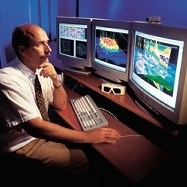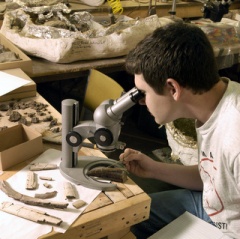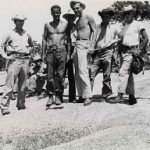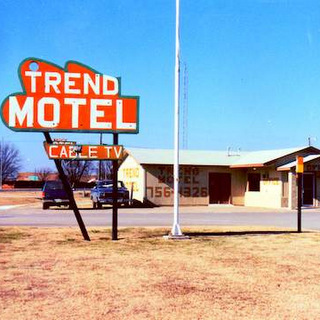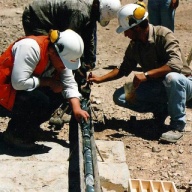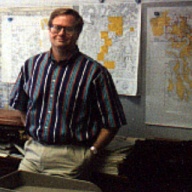Job Skills You Need As A Petroleum Geologist
Geologists are scientists with great jobs…but few of them will ever fit the “mad scientist” stereotype. That’s because most geologists are well-rounded in their thinking and education. They find all the sciences exciting, and many different sciences are brought together in geology.
Petroleum geologists spend about 95% of their time in an office environment. They use computers to draw maps and cross-sections, and to process a lot of data. They make extensive use of electric logs. They use microscopes and other tools to make decisions.
Occasionally, petroleum geologists will visit the “field.” They consider this to be a vacation from office work. This gives them a chance to dress up like cowboys, do some blue-collar-style male bonding, and drink beer at night. They even think up ways to get their company to pay for trips to the Bahamas so they can “study” modern sedimentary environments. Petroleum geologists often enjoy a couple of expense-paid geological field trips each year to geologic places of interest like the Grand Canyon, the coast of California, the Swiss Alps, the Bahamas, or the Red Sea.
At a drilling location, they may examine well samples of potential “pay zones” that are penetrated. They may visit a drillsite to examine a new core. Or, they just may want to be there at the important time when the well is logged.
If you want to be a good geologist, you should have great curiosity, a scientific bent, an analytical mind, some artistic ability, creativity, the knack for processing and distilling huge amounts of data, a good sense of humor, and the ability to communicate your ideas to others.
Why petroleum geology might work for you:
- If you’re not hip enough to be an artist, but you’re not wound tight enough to be an engineer, you might want to think about petroleum geology!
- If you like detailed work, but can’t stand the thought of crunching numbers all day long like engineers, you might want to think about petroleum geology!
- If you can pass math through Calculus II, but pages of formulas don’t turn you on, you might want to think about petroleum geology!
- If maps fascinate you, and you don’t particularly care for spreadsheets (engineers love the dang things), you might want to think about petroleum geology!
- If you prefer working solo most of the time, you might want to think about petroleum geology!
- If you like to draw and express things graphically, but you’re no Van Gogh, you might want to think about petroleum geology!
- If you can’t clear the dance floor, yet you can’t bear to sit the next one out, you might want to think about petroleum geology!
You don’t need to be Einstein, Da Vinci, or Bill Burr, but being well-rounded really helps a lot. Petroleum geologists are often jack-of-all-trades types. They must be creative enough to come up with new ideas, but controlled enough to stick to a scientific method.
A petroleum geologist works 90% with things, but she still must possess basic interpersonal skills and get along with people in the modern team environment.The ability to establish friendly communications is helpful, as many types of people must be dealt with regularly. Nevertheless, social skills are less important than in many other white-collar occupations. Thankfully, people expect geologists and other science-types to be just a little weird. One petroleum geologist managed to stay employed for thirty years despite the fact that he deleted his voice mails without listening to them.
Education
Finally, you should plan to get both B.S. and M.S. degrees in geology, as the majority of fully-employed petroleum geologists have both. A master’s degree is the gold standard in petroleum geology.
Here is a touchy subject that’s not discussed much: Having a Ph.D. in geology will clearly help you in a teaching or research environment, but will do very little to enhance your job prospects (or your salary) in the portion of the petroleum field that is centered on finding oil and gas deposits. Often, a Ph.D. will make you less appealing to many employers in the petroleum industry…at least as far as being an “oil-finder” is concerned.
Try to get a handle on your geology direction by the end of your freshman year at college. If you happen to major in another science, and then decide you want to switch to geology, that will take some doing. You will be required to complete a great deal of geology undergraduate coursework if you later decide to get a M.S. in geology. Most M.S. degrees in geology have entry requirements along the following lines. It is going to go much easier on you if you already have a B.S. in geology when you apply to graduate school!
To start a Master’s degree in geology, you will need a B.S. in Geology, OR you will have to make up the following: Physical Geology (4hours), Historical Geology (4 hours), Mineralogy (4 hours), Optical Mineralogy (4 hours), Petrology (3 hours), Stratigraphy/Sedimentation (3 hours), Structural Geology (3 hours), Geology Field Camp (6-8 hours), General Chemistry (8 hours), Physics (8 hours), Computer Science or Statistics (3 hours), Calculus (6 hours), and a possible foreign language requirement. These are just general guidelines, and do not apply to any particular school!

